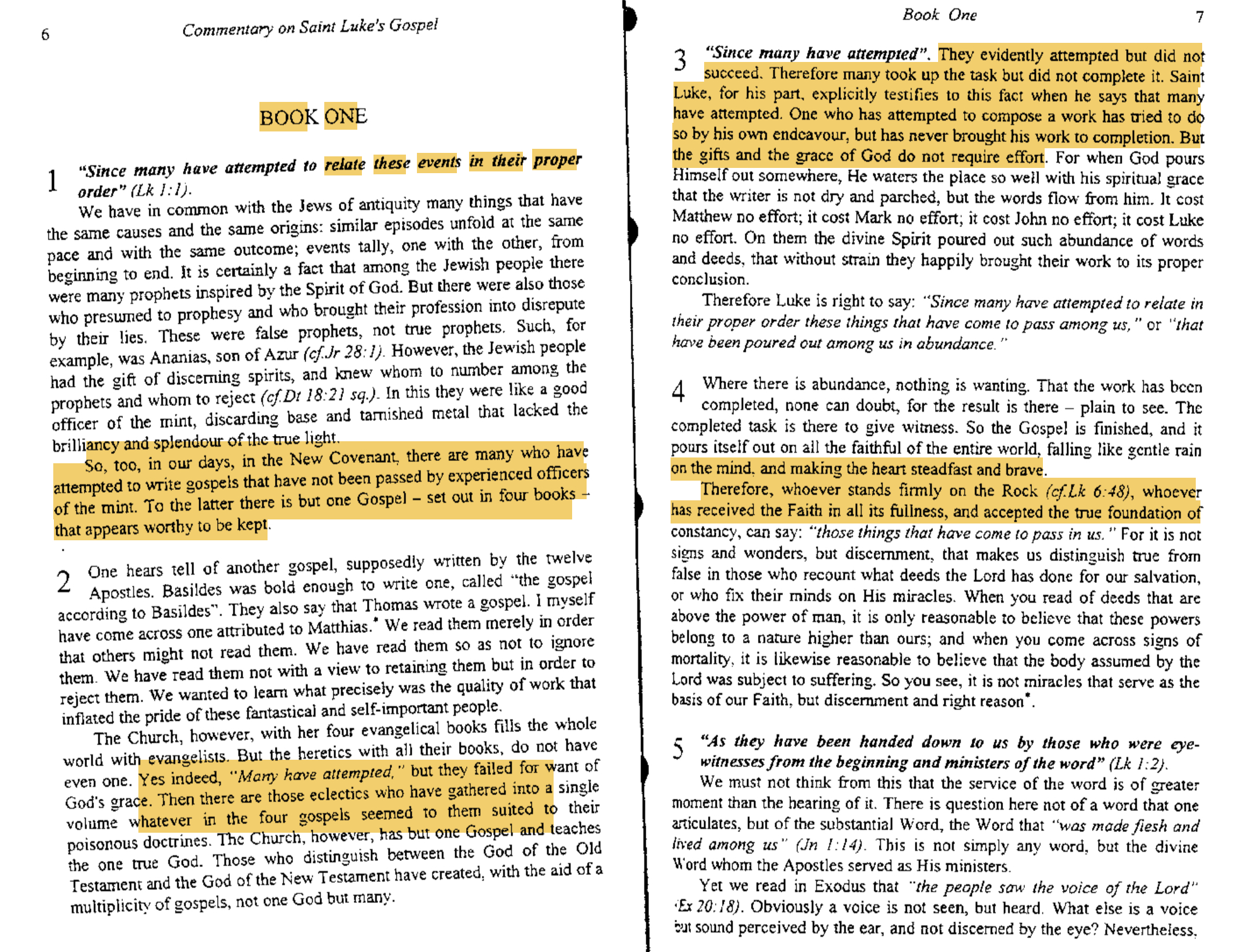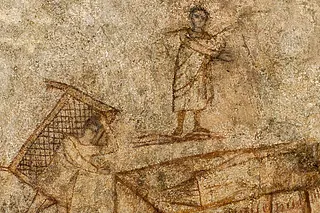Introduction:
It is often claimed by apologists that the 4 gospels exist in harmony, and differences within can be worked out. “Contradictions” under this paradigm are seen as an impossibility, as each writer compliments, and enriches one another. Muslims tend to sometimes favor a more skeptic approach to the Bible, and Christian tradition due to our presuppositions of scripture, and isnad-focused history. This approach is sometimes unwarranted even if Christians’ insistence on a four-fold harmony is overboard as we are too quick to assume ideas, and positions that they would not merely grant. One of the biggest issues Muslims with a surface-level approach to the Bible have is proving authorial intent; that is, determining what the author himself wanted us to believe. If Mark, and Matthew contradict then a Christian will simply appeal to tradition and say its additional information or different perspectives, and harmonize. To counter this, one needs to pay special attention to the aims of the biblical authors as we do for every other text. In this article, we will be showing how the author of Luke-Acts believes Mark (and possibly Matthew) is deficient and has thus taken it up to task to produce a proper narrative. This will then be shortly compared to Catholic statements of inspiration.
Luke-Acts’ Genre and it’s Historical Conventions:
Most academics would agree that Luke-Acts is a work of ancient historiography [1] and Craig Keener, one of the most respected Christian academics today produces a massive list of scholars agreeing. Note: This does not mean that Luke-Acts is suddenly completely reliable or that the events within occurred. It was quite common to fabricate, and edit sources as a historian as we will see here and in our upcoming work on the Pastorals. As for general reliability, we are preparing an in-depth review of the authorship, and dating issues of this text. Regardless, for the purposes of this article we simply need to point out the uncontroversial fact that this text is a work of ancient historiography. Multiple points support this. Luke’s claim of investigation to set the truth parallels historical works such as Thucydides, and Josephus in their prologues. The use of “we” in Acts indicates involvement used by Hellenistic historians. Speeches, and a preface also stand out. Remember, no other gospel has a preface like Luke does. We have listed a few brief parallels of many without much explanation as will not be defending the specific genre in-depth as this is an uncontroversial point and the main dissenters are generally mythicists who say Acts is a fiction/novel. Rather, we will focus on the prologue which is steeped in historical conventions of the genre.
Luke-Acts is unique in that it is the only gospel which sees itself as ancient history. It is thus in this well-studied genre that we need to understand the author. If for example a poetic piece mentions a popular metaphor we expect it to be in line with usage of that metaphor in the past, as the author would be using this technique specifically for its audience whose knowledge on this would already be assumed. By the time Luke-Acts was written or was being written there were multiple works of Ancient history known worldwide. Herodotus (484-420 BCE), Thucydides (460-400 BCE), and Polybius (200-115 BCE) were widely known, and studied and were the pinnacles of ancient historians. By Luke’s time ancient conventions had been set. We find confirmation of this in the fact that Luke’s prologue is remarkably similar to Josephus’ prologue. We know Josephus was contemporary to Luke and thus similarities cannot be ignored. Josephus scholar Steve Mason on page 253 of his Josephus’ and the New Testament says:
As we saw in chapter 3, an indispensable feature of any Hellenistic history book was the prologue. The Greek sense of order required that written treatises have a clear beginning, middle, and end. In contrast to the Hebrew Scriptures, which tend to jump right into the narration of events, Greek historians were required to begin with an introductory prospectus. This opening statement had to accomplish several things at once. It had to state clearly the aim, scope, and thesis of the work. Even more crucial to the writer’s success, it had to convince the reader that the subject was of the utmost significance, and that the writer was singularly qualified to deal with it.
Steve Mason summarizes topoi (literary theme or focus) within Hellenistic history works’ prologues (Luke’s milieu). The following list is taken from NPL Allen’s “Josephus and Luke-Acts: A critical review of a thesis by Steve Mason”:
With reference to Mason’s insights, the following features characterize a typical πρόλογος [prologue] for a Hellenistic historical work, viz.:
1. the topic and its importance;
2. the inadequacy of previous histories of this period;
3. the author’s circumstances and his motivations for writing;
4. the author’s complete impartiality and concern for the truth;
5. the author’s strenuous research efforts and access to eyewitness testimony;
6. the author’s thesis, including a view of the causes of the events in question;
and occasionally
7. a brief outline of the work’s contents.
As historians would overlap in their writings due to discussing the same events, their prologue had to separate their work from the rest. In Josephus’ case previous authors had not portrayed the Jews as they should have, and have supposedly misconstrued the course of events. Luke had Mark and perhaps Matthew (if you accept Farrers) at his disposal and thus these have to be at least part of the comparison he has in mind. Note the topoi presented above. Luke’s prologue fulfills all of them. For an apologist, the only aspect that is seemingly taken out is the 2nd one as they cannot fathom scripture disagreeing with scripture. This is ad-hoc, and ignores the historical context of Luke-Acts, and assumes a specific intent on the part of Luke-acts laden with presuppositions not justifiable in the text. If one is not burdened with these presuppositions, they will have no problem taking what Luke does at face value which is an incorporation of these major prologue themes in Ancient history writing.
A Linguistic and Thematic Analysis of Luke’s Prologue:
Having discussed why we expect Luke to be critical of previous works due to his genre, we will now list the prologue and prove decisively that Luke saw previous texts as defective through a linguistic, and thematic analysis before discussing the impact this has on scripture, and inspiration.
1 Since many have undertaken to compile a narrative about the events that have been fulfilled among us, 2 just as they were handed on to us by those who from the beginning were eyewitnesses and servants of the word, 3 I, too, decided, as one having a grasp of everything from the start, to write a well-ordered account for you, most excellent Theophilus, 4 so that you may have a firm grasp of the words in which you have been instructed. (Luke 1:1-4 NRSVUE)
In simply 4 verses, Luke has given us a wealth of information to expound on. Luke actually criticizes the earlier Jesus accounts who have ‘undertaken/attempted’ (ἐπεχείρησαv) to draw up an account of Jesus’ life and ministry. A cursory reading would tell us that according to Luke, the previous attempts were unsuccessful, for if they were apt, and valid he would not need to write a narrative himself. Christian apologists who deny this are essentially asking us to believe the equivalent of someone coming up to us and telling us “Many people (Mark/Matthew) have written on this topic and they succeeded and so since they already succeeded, I will also write so that you can get the truth even though you already have access to the truth since these previous writings were already successful”. Anyone with a sound mind can see that this sentence is nonsensical, and yet this is what the traditional Christian reading collapses to. The following is Ambrose of Milan’s (340-397) exegesis in which he agrees with our reading and sees it as the clear one, although sadly he was unaware of the Synoptic Problem and so fails to truly grasp the implications of such a view.

Looking at the specific Greek word itself which Luke has described the previous narratives by, it is clearly negative as this word is only used by Luke and in reference to unsuccessful attempts by the Jews (cf. Acts 9:29; 19:13), and Josephus concurs and uses this word similarly [2]. The LXX provides additional support for this interpretation (cf. 2 Chron 20:11; Ezra 7:23; 1 Esd 1:26; Esther 9:25; 16:3; 2 Macc 7:19; 9:2; 10:15; 15:33; 3 Macc 6:24; 7:5; 4 Macc 1:5; Sir 9:4) and Origen in his commentary on John interprets the Lukan prologue negatively although he believes it references heretical gospels. This is followed by other fathers as well. It’s important to realize that for Origen, Luke predates Mark and is independent of Matthew and such this seems like the natural interpretation. For us however who have realized the truth of Markan Priority, we can clearly see Luke’s intentions. For the extreme minority uncomfortable with Markan priority, they would still have to contend with Luke using Matthew. Alexander Loveday, who has written a book on the preface notes that [3]; “Logically speaking it is impossible to escape the derogatory implications when the phrase is used in the third person”. Francis Watson agrees and states [4]:
“Inadequate predecessors establish the need for Josephus’s contribution, but they also confirm the significance of the subject matter. For Luke too, the reference to earlier writings serves rhetorically to establish the significance of “the events that have taken place in our midst.” In contrast to Josephus, there is no overt criticism. Yet Luke cannot only mean that his writing follows a precedent set by others. The reference to predecessors serves to establish the significance of one’s own work, and it cannot do so if the earlier work leaves nothing further to be said. According to Luke, “many have attempted to compose an account of the events that have taken place in our midst.” The verb (ἐπεχείρησαν) is used elsewhere for unsuccessful attempts. In Jerusalem the Hellenists “attempted” but failed to kill the newly converted Saul (Acts 9.29). In Ephesus Jewish exorcists “attempted” to invoke the name of Jesus, but with unfortunate results (Acts 19.13-16). According to Luke’s prologue, earlier evangelists “attempted” to compose an adequate narrative whereas he writes on the basis of prolonged and careful study, so that Theophilus may place full confidence in his version of the story (Lk. 1.3-4).”
This is not unique to Luke. Again, Josephus, a contemporary in his literary milieu, makes the same comments about previous works on his topic (much like Mark to Luke). The fact that ‘many’ have attempted to write on this topic shows its importance and their failure gives Luke a reason to write. Luke contrasts these failed attempts with his. He informs Theophilus that he has researched everything from the beginning so that he may provide him with a ‘firm grasp’ of the truth. The Greek word used is asphaleia, which roughly translates to secure basis (and from which we get the modern word asphalt). Mason again notes [4]:
“The three occurrences of the related adjective in Acts (21:34; 22:30; 25:26) all concern the problem of sorting out reliable ground in the midst of conflicting claims. That is also the sense here in the prologue. The author says, in effect: “you have read many competing accounts; now I shall set the record straight.” Although his criticism is restrained, he clearly means to present a story that is superior to the others.”
In his preface of Acts, Luke even ends up using the word tekmeria, which was a technical rhetorical term for proof. By all accounts, Luke has crafted a theological historical introduction to both works. Just like Josephus writes to Epaphroditus, Luke writes to Theophilus. Both names were theophoric and seem to be successful aristocrats who were patrons, and thus sponsors of these respective works which instantly puts Luke in the same circles as Josephus. This means that given established dates for texts Luke is reliant on, and the fact that we know Luke is post-75 AD at least [See our upcoming video on Timothy], we can be confident that he may have been aware of Josephus’ War as Josephus was a unique individual in these circles, and was evidently popular. Luke’s patron would doubtlessly be aware of private readings of Josephus, and seeing the parallels in author profiles with Luke, it is immediately conceivable that Luke was at least made aware of Josephus, writing in his milieu. We see here that the same word kratistos is used in both Luke, and Josephus to describe their patrons. This term is used nowhere else in the New Testament and Luke only uses it to describe the governors Felix, and Festus who are a specific type of lower Roman nobility. He shies away from using this word for higher officials such as Herod, or Agrippa. This specificity is further evidence that unless Luke has fabricated this Theophilus, he is dealing with a patron in the same literary circles as the Epaphroditus of Josephus.
The argument for Lukan reliance on Josephus is complex and intriguing to say the least. It is not the purpose of this article however to evaluate these claims. By establishing that Luke, and Josephus are in similar aristocratic literary circles, we can be even more confident that the similarities between Luke, and Josephus in the prologue can be interpreted the same way. Thus, it is quite clear that Luke sees previous gospels as deficient whether it be Mark, Matthew, or both. At this point, some Christians may contend that Luke was simply fixing Mark’s order. It is here that there is a striking point of inconsistency. They derive this conclusion from the fact that Luke consciously alters the order of Mark and decide that he was simply criticizing Mark’s lack of order. The issue here is, when Mark, and Luke’s content is put side-by-side we can see that Luke is continuously engaged in conscious rewriting of Mark. We have already previously given a short example in our article on Mark, and Mary here; however anyone can simply open up a book on synoptic parallels and see how Luke adds details, omits them, moves them around, and generally freely manipulates the Markan text. Our favorite example is his altering of the Olivet Discourse. The most natural interpretation therefore is that Mark is deficient in both order, and content. For one who believes Luke (only?) knows of Matthew, they must face an even bigger problem because Matthew is a lot more clearly arranged than Mark and Luke’s departure from this is even more striking. He is criticizing Mark and perhaps even Matthew if one holds to the Farrer’s hypothesis. This is made even more clear when we see the edits Luke has made to the Markan episodes and narrative. If Luke saw Mark as divinely inspired, and the faithful recollections of Peter, why did he change, add, and omit so much? In fact, if the gospels were seen as divinely inspired from the beginning why was Mark criticized so much from Luke, and Papias’ contemporaries? If the earliest Christians didn’t see these texts as inspired then why should we? Of course if Christians believe Luke saw Mark as inspired scripture, they have to admit that Luke was altering scripture as he saw fit, in which case they admit themselves to a situation far worse than what we have put them in.
Catholic Views on Inspiration and Brief Commentary:
We will now share a few quotes from Newadvent [4], a Catholic encyclopedia website which discusses inspiration. We will not be giving an in-depth conclusive analysis. Rather, we are simply taking select statements that show the general view of inspiration that Catholics, and Orthodox undoubtedly hold and briefly commenting on its divergence from Luke each step of the way so that future researchers can discuss, and develop these ideas in-depth.
“These books are held by the Church as sacred and canonical, not as having been composed by merely human labour and afterwards approved by her authority, nor merely because they contain revelation without error, but because, written under the inspiration of the Holy Ghost, they have God for their author, and have been transmitted to the Church as such.” (Concil. Vatic., Sess. III, const. dogm, de Fide, cap. ii, in Denz., 1787)
Luke as a work of history clearly identifies previous attempts as fallible human works, so unsuccessful that they require him to write a narrative from the beginning to finally put Theophilus on a ‘secure footing’.
“The Holy Ghost Himself, by His supernatural power, stirred up and impelled the Biblical writers to write, and assisted them while writing in such a manner that they conceived in their minds exactly, and determined to commit to writing faithfully, and render in exact language, with infallible truth, all that God commanded and nothing else; without that, God would not be the author of Scripture in its entirety” (Encycl. Provid. Deus, in Dena., 1952).
From a Catholic POV, God commanded Mark to write a deficient account of Peter’s recording, and then commanded Luke to write an account fixing Mark.
According to the Encyclical Prov. Deus, “God stirred up and impelled the sacred writers to determine to write all that God meant them to write” (Denz., 1952).
Did God tell Mark to commit a deficient narrative, and then inform Luke to fix it?
Considered in its term, inspiration is nothing else but the biblical text itself. This text was destined by God, Who inspired it, for the universal Church, in order that it might be authentically recognized as His written word.
Did Luke have this view of Mark? Luke is directly critical of his predecessors and follows historiographical conventions. It would seem Catholics have to back-project their view of inspiration onto Luke.
For this cause, also, it is clear that an inspired text cannot err. That the Bible is free from error is beyond all doubt, the teaching of Tradition. The whole of Scriptural apologetics consists precisely in accounting for this exceptional prerogative.
Luke directly contradicts this. According to Luke, his previous sources have errors.
Conclusion:
Again, our aim is not to thoroughly explore Catholic views of inspiration and we recognize that even within Catholicism theories of inspiration can vary slightly. We simply wish to point out certain normative statements which at face value contradict Luke as we have it today. We ask the Christians why Luke decides to describe his previous narratives as deficient, and with the same word he uses for unsuccessful attempts by the enemies of Jesus if he believed the previous gospels were inspired in such a way that they “cannot err”, and are with “infallible truth”. The simplest explanation is that Luke sees Mark as simply a human document recording traditions about Jesus. The author of Luke does not treat it like a sacred, inspired, canonical text. What we have here is scripture criticizing scripture and if Christians see no issues with that, and inspiration, then there is not much more that can be said.
[1] Craig Keener, Acts: An Exegetical Commentary: Introduction and 1:1-2:47, pg. 90
[2] Mason, Steve. Josephus and the New Testament. 2nd Ed., 2003., pg. 255
[3] Alexander, Loveday. The Preface to Luke’s Gospel. Literary convention and social context in Luke 1.1-4 and Acts 1.1, 1993, pg. 110.
[4] Watson, Francis. Gospel writing: A Canonical Perspective, 2013, pg. 123.
[5] https://www.newadvent.org/cathen/08045a.htm


